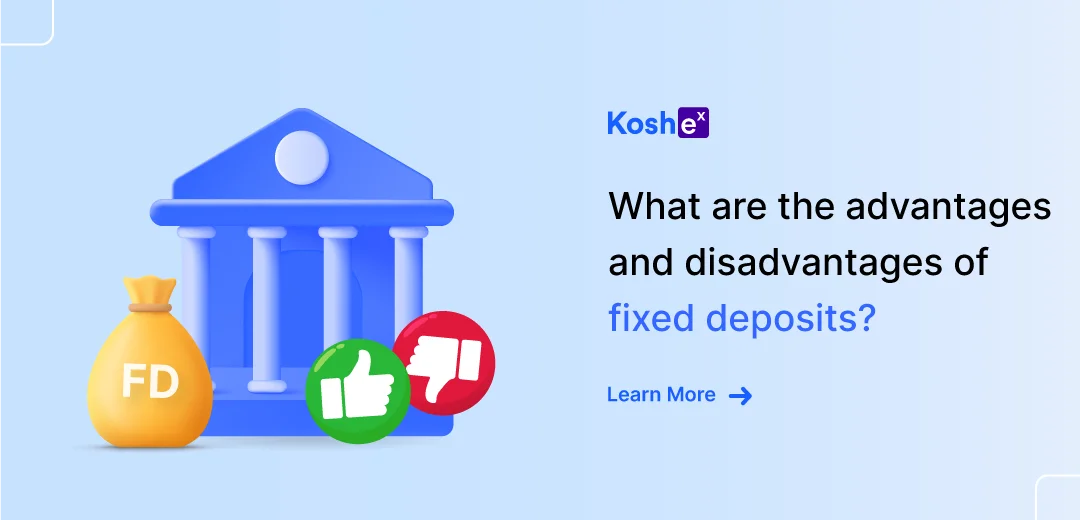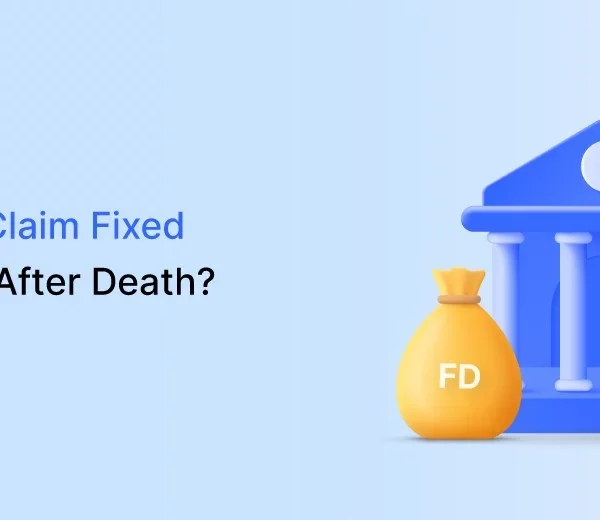Fixed deposits are a popular investment option known for their stability and guaranteed returns, but they come with their own set of pros and cons. In this blog, we’ll explore the key advantages and disadvantages of fixed deposits to help you make an informed financial decision.
Are you looking for a safe investment option that offers guaranteed returns? Well, look no further than fixed deposits.
An RBI-regulated investment vehicle, fixed deposits have been popular with generations of investors. Market volatility does not impact fixed deposit returns. Hence, they are ideal for investors with a low-risk appetite.
Despite being around for decades, fixed deposits, it seems, are here to stay. According to Indian Express, the total number of fixed deposits in India increased to Rs 151.13 lakhs during FY 21.
Fixed deposits earn interest at a fixed rate for the entire investment tenure. This interest income constitutes your FD profit. You can either receive the interest as a lump sum on maturity or as periodic payouts throughout the term.
In an age where the investment market is packed with options, how does FD compare with other vehicles? In terms of returns, mutual funds score over FD. However, when it comes to the safety of capital, FDs are way safer.
So, let us now dive deep in and explore the advantages and disadvantages of FDs.
Features of a Fixed Deposit
- For a fixed deposit account opening, we have to fill out an application form and submit the required KYC documents.
- The investment tenure ranges between 7 days and 10 years.
- Every FD account has a minimum and maximum limit, which varies from one financial institution to the other.
- FDs come in two forms – cumulative and non-cumulative. In cumulative FD, the interest is compounded annually and paid on maturity. In non-cumulative FD, the interest is paid monthly, quarterly, half-yearly, or annually, based on our requirements.
- FD interest rates depend on the FD account holder’s age, the invested amount, and the term. For instance, senior citizens enjoy additional interest rates on their FDs.
- Every FD has a lock-in period, and premature withdrawal may attract a penalty.
- We can use FD as collateral to secure loans or overdrafts. In this case, the lender will typically charge a lower interest rate, 2-3% over the FD interest rate.
- FD overdrafts attract interest only on the sum withdrawn and not on the approved amount.
- FD investments up to Rs. 1.5 lakh are tax-deductible under Section 80C of the Income Tax Act.
- If the rate of interest exceeds 10% p.a., the financial institution will deduct TDS.
Pros and Cons of Fixed Deposits
Advantages of Fixed Deposits
- Assured returnsThe FD interest rate remains unchanged throughout the entire term. In other words, your deposits will earn interest at a fixed rate until maturity. This ensures guaranteed returns. However, upon renewal of the deposit after maturity, the prevailing interest rates at the time of renewal will apply.
- Protection of the principal The Deposit Insurance and Credit Guarantee Corporation (DICGC) ensures the protection of capital up to Rs 5 lakhs, in case the bank defaults. Hence, investing in FDs is one of the safest ways to make money grow.
- Collateral for loans FDs can be used to secure loans. In this case, the interest rate is considerably lower than other personal loans. Besides, FD loans allow the liquidation of funds without extra charges. The interest is charged only on the money withdrawn; the remaining deposit continues to earn interest at the applicable rates.
- Improved credit score further, borrowing against FDs help improve credit scores, boosting the ability to get regular loans for future requirements. This is of course given that the payments against the loan are made in a timely manner.
- Flexible tenure and renewal you can structure the deposit period according to your convenience. Deposit tenures typically range from 7 days to 10 years, depending on where we open the FD.
- Auto-renewal You can also conveniently renew the deposits on maturity. It is best to set a standing instruction to auto-renew the FD once it matures. However, the interest rates will change to the prevailing interest rates when renewed.
- Free from market volatility investment in fixed deposits makes your investment portfolio immune to market fluctuations and market risk.
- Easy liquidation You can easily liquidate the fixed deposit either online or offline. However, premature withdrawal of fixed deposits may attract penalties.
- Tax Benefits under Section 80 CC A deduction of up to Rs 1,50,000 is available upon investing in a 5-year tax saver deposit under Section 80 CC of the Indian Income Tax Act.
Disadvantages of Fixed Deposits
- Locked-in feature With FDs, the money is locked in for the deposit tenure. While premature withdrawal is permitted, it may come with a penalty. Such penalties are charged on the interest income.
- Tax on interest earned on fixed deposits is taxable per applicable tax slabs according to the Indian Income Tax Act of 1961. Depositors under 60 years can submit Form 15 G. Moreover, senior citizens can avoid tax deducted at source or TDS.
- Fixed interest rateDeposit interest rates remain constant during the entire fixed deposit term. Now, financial institutions review their interest rates periodically. So, with fixed rates, you cannot benefit from a rise in rates.
- Do not offer a hedge against inflation fixed deposits offer one of the lowest, post-tax returns – a situation further aggravated by rising inflation. The real interest rate (Nominal interest rate – rate of inflation) often remains low.
For instance, let us say that the nominal rate of interest offered by the bank is 12% p.a. If the inflation rate in the economy is 5% p.a., the real interest rate is 12%-5%= 7% p.a.
Conclusion
Fixed deposits offer a safe and reliable investment avenue if you are looking for assured principal and guaranteed returns. They are especially suitable for senior citizens and risk-averse investors. Further, fixed deposits can also be used for diversifying portfolio risk.
You can sleep easy knowing that your capital is protected and you can meet your defined financial goals. However, it is best to consider both the benefits and disadvantages of fixed deposits before deciding whether and how much to invest in them.
With this extensive overview of FDs, you can sign up with Koshex and explore various ways to invest in FDs. Backed by a team of experts, Koshex is a comprehensive platform that takes care of all your investment queries and requirements.
FAQs
What is the main limitation of an FD?
FDs come with two main disadvantages:
The interest income is taxable.
The returns are considerably lower than market-linked instruments like mutual funds.
However, on the brighter side, FDs are market-agnostic. Hence, even if the market turns volatile, FD returns are not impacted.
What are the risks of investing in a fixed deposit?
Investing in deposits offered by small cooperative banks involves a small risk of default. However, the Deposit Insurance and Credit Guarantee Corporation (DICGC) insures FDs with a value of up to Rs. 5 lakh. So even if the bank defaults, the deposit will remain safe.









Leave a Comment